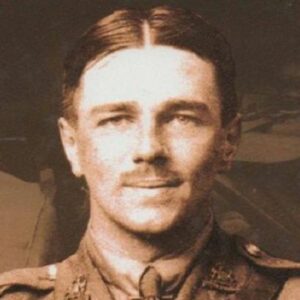Wilfred Owen was a poet and a soldier from England. During his childhood, his family moved between Birkenhead and Shrewsbury, and he attended the Birkenhead Institute and Shrewsbury Technical School. He was raised as an Anglican and was a devout believer as a child. He lost trust in the church, though, because of its rituals and failure to assist those in need. When the war broke out, he enlisted in the Artists’ Rifles Officers’ Training Corps. He was commissioned as a second lieutenant in the Manchester Regiment after training at Hare Hall Camp in Essex. He was sent to Craiglockhart War Hospital in Edinburgh for treatment after being struck by a trench mortar. There he met poet Siegfried Sassoon, whose realism, as well as the romanticism of Keats and Shelly, had a significant influence on his work. Historians consider Owen to be one of the most important poets of the First World War. His war poetry depicting the horrors of trench and chemical warfare has made him famous. “Dulce et Decorum Est,” “Insensibility,” “Anthem for Doomed Youth,” “Futility,” and “Strange Meeting” are among his best-known compositions. He was shot and killed while attempting to cross the Sambre canal. On Armistice Day, his parents in Shrewsbury received word of his death.
Childhood and Adolescence
Wilfred Edward Salter Owen was born in Oswestry, Shropshire, England on March 18, 1893 parents Thomas Owen and Harriet Susan Shaw Owen. Harold, Colin, and Mary Millard Owen were his siblings, and he was the oldest of four children.
His grandpa, Edward Shaw, owned a nice house where his family lived. After his death, the house was sold. While Thomas Owen worked for a railway firm, the family stayed in Birkenhead. His father was relocated to Shrewsbury, and the family lived in Canon Street with Thomas’ parents during this time. When Thomas was promoted to stationmaster at Woodside station in Birkenhead in 1898, he was sent back to Birkenhead.
In the Tranmere neighborhood, his family relocated three times in a row. In 1907, they returned to Shrewsbury. Wilfred went to Birkenhead Institute and Shrewsbury Technical School for his education. When he was ten years old and on vacation in Cheshire in 1903, he found his lyrical abilities. He was raised as an evangelical Anglican and was a passionate believer in his youth.
Career of Wilfred Owen
Owen was a pupil-teacher at Shrewsbury’s Wyle Cop School. He passed the University of London’s matriculation exam in 1911, but was not eligible for a scholarship. In exchange for free lodging and some tutoring for the entrance exam, he worked as an assistant to the Vicar of Dunsden near Reading. He also took botany lectures at Reading University College.
At the request of the English Department’s head, he took free Old English classes. He was disillusioned with the Church in Dunsden parish because of its pomp and circumstance, as well as its reluctance to assist those in need.
He worked as a private English and French tutor at the Berlitz School of Languages in Bordeaux, France, beginning in 1913, and subsequently with a family. He met Laurent Tailhade, a French poet, there.
He enlisted in the Artists’ Rifles Officers’ Training Corps when the war broke out. Hare Hall Camp in Essex was where he received his training. In 1916, he was commissioned into the Manchester Regiment as a second lieutenant.
He was diagnosed with neurasthenia, or shell shock, after being hit by a trench mortar, and was transported to Craiglockhart War Hospital in Edinburgh for treatment. He met poet Siegfried Sassoon there.
At Craiglockhart, Dr. Arthur Brock advised him to write poetry about his war experiences. “Futility” and “Strange Meeting” are two of his poetry. He made smart pals and taught at Tynecastle High School. Owen was influenced by the Romantic poets Keats and Shelley in his early writing and poetry. Siegfried Sassoon’s influence can be noticed in his poems “Dulce et Decorum Est” and “Anthem for Doomed Youth,” which were written later.
For the verses he planned to write, he wrote a “Preface.” The only poems he saw published were those in The Hydra, which he edited, and “Miners,” which appeared in The Nation. He was assigned to the Northern Command Depot in Ripon in 1918. He commanded Second Manchesters soldiers in storming a number of German strongholds around the village of Joncourt.
Major Projects of Wilfred Owen
“Anthem for Doomed Youth,” “Futility,” “Dulce Et Decorum Est,” “The Parable of the Old Men and the Young,” and “Strange Meeting” were five of Owen’s best-known poems published before his death.
Achievements & Awards
Owen received the Military Cross for his bravery and leadership during the Battle of Joncourt. On February 15, 1919, the award was gazetted, along with a citation.
Personal History and Legacy
Robert Graves and Sacheverell Sitwell, two of Owen’s acquaintances, have suggested that he was homosexual. In May 1918, it was rumored that Owen had an affair with Scottish novelist C. K. Scott-Moncrieff. Simon Patterson has restored the forester’s house in Ors, Maison forestière de l’Ermitage, where Owen spent his final night, into an art piece and permanent homage to Owen and his poems.
On November 4, 1918, a week before the war ended, he was shot and murdered while attempting to cross the Sambre canal. On Armistice Day, his parents in Shrewsbury received word of his death.
Mrs. Harold Owen, his sister-in-law, donated his manuscripts, photographs, and letters to the English Faculty Library at the University of Oxford in 1975. A collection of his family communications is housed at the Harry Ransom Humanities Research Center in Texas.
Estimated Net Worth
Wilfred is one of the wealthiest poets and one of the most well-known. Wilfred Owen’s net worth is estimated to be $1.5 million, according to Wikipedia, Forbes, and Business Insider.
Trivia
Pat Barker’s novel “Regeneration,” Stephen MacDonald’s play “Not About Heroes,” and Dean Johnson’s musical “Bullets and Daffodils,” featuring Christopher Timothy as the narrator, are all about this poet.


